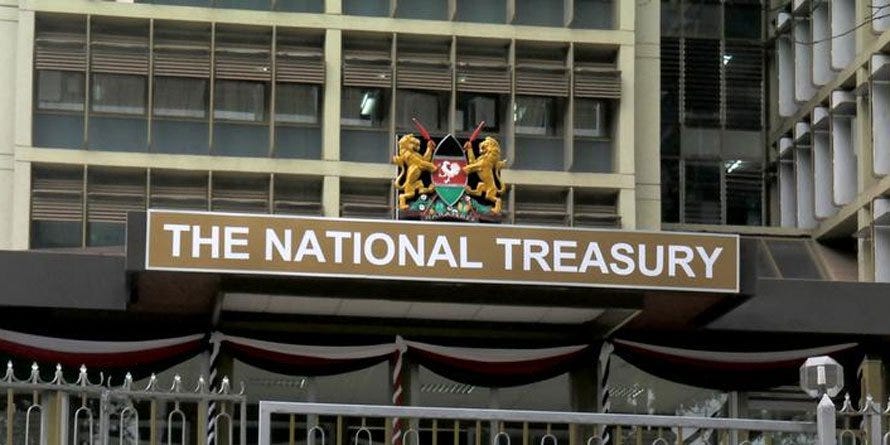Kenya Offers Private Investors Opportunity to Invest in 100 Dams
In a bid to address the pressing issue of water scarcity in Kenya, the government has presented private investors with an opportunity to invest in the construction of 100 dams. The government aims to secure approximately KES 1.7 trillion in funding.
During a pre-bid meeting with potential investors, Alice Wahome, the Water Cabinet Secretary, highlighted that:
Some of the dams would be situated on public land, including forested areas.
To maintain the project's national character, these specific sites will not be sold to private investors.
To facilitate the partnership between the government and private investors, the government will provide land for the dam sites. Notably, this land will remain under the jurisdiction of the national government, and no land will be sold in the process, as emphasized by Ms. Wahome.
Water scarcity has posed significant challenges, particularly in peri-urban, rural, and marginalized areas. By adopting Public-Private Partnership (PPP) initiatives, the Ministry of Water intends to ensure that sustainable and reliable water services become accessible to every Kenyan citizen.
Click here to access the full article
ECONOMY
Treasury Nears Emergency Loan Limit as Cash Flow Pressures Rise
Recent data released by the Central Bank of Kenya reveals that outstanding overdrafts reached an all-time high of KES 78.53 billion on May 5. This amount is just shy of the KES 80 billion limit set at the beginning of the current financial year, which was raised from the previous ceiling of Sh75 billion.
The overdraft facility serves as a temporary source of cash for crucial payments and emergencies.
It is typically utilized by the Treasury when revenue streams, such as tax and borrowing receipts, fail to match the government's expenditure requirements in a timely manner.
This facility proves vital in financing short-term needs for the Treasury, including urgent payments like salaries and other essential recurrent expenditures such as debt repayments. The increased reliance on this facility suggests that the Treasury is grappling with cash flow challenges, exacerbated by domestic borrowing falling short of the targeted amount.
Domestic borrowing through bonds and bills for the nine-month period leading up to March 2023 fell short of the Sh407.72 billion target by Sh169.36 billion. Consequently, tapping into the overdraft facility has become a necessity for the Treasury.Utilizing the overdraft facility incurs an annual interest charge of seven percent of the outstanding amount at the end of each month, as stipulated by the Office of the Controller of Budget.
Click here to access the full article
TAX
Court Grants Temporary Relief to Manufacturers in Tax Dispute
Manufacturers in Kenya have been granted temporary relief by the court, following a decision to block the Kenya Revenue Authority (KRA) from doubling excise stamp taxes on beer, bottled water, and cosmetics. The court ruling, issued by Justice Hedwig Ong'udi, halts the enforcement of regulation 5 of the Excise Duty (Excisable Goods Management System) amendment regulations of 2023.
The Law Society had contested the amendment, arguing that the regulations had not undergone the required public participation as mandated by law. Lawyers further highlighted that the implementation of these regulations would result in a significant price increase for various goods, posing a threat to the survival of manufacturers involved in the sale and distribution of consumable products.
In her ruling, Justice Ong'udi emphasized that state organs must carry out their responsibilities in compliance with the Constitution and established statutory laws. This decision provides manufacturers with temporary respite as they navigate the tax dispute.
Click here to access the full article
BANKING
1. Kenya's Microfinance Banks Report Jump in Net Losses as Income Declines
Kenya's microfinance banks experienced a significant setback as their collective net loss surged by 77.5% to KES 1.3 billion in December last year compared to the same period the previous year. This alarming increase was primarily attributed to a decline in income, according to a recent report released by the Central Bank of Kenya (CBK).
The report revealed that the microfinance banks' after-tax loss rose by KES 569 million, reaching KES 734 million from the previous year's figure. This negative trend occurred as customer deposits and income declined, while expenses escalated. Specifically, customer deposits fell by eight percent, dropping from KES 50.4 billion to KES 46 billion by December 31, 2022.
CBK's Bank Supervision Annual Report 2022 stated that the decrease in deposits was a result of funds being transferred to more enticing investment options due to an overall surge in interest rates.
Click here to access the entire article
2. Rise in Financially Struggling Banks Highlights Challenges for New Central Bank Chief in Kenya
Thirteen commercial banks in Kenya were found to be in poor financial health last year, marking a significant increase of 44 percent compared to the previous year, according to a report by the Central Bank of Kenya (CBK). The breach of critical supervisory and regulatory requirements, such as maintaining required capital levels, highlights the challenges faced by the new Central Bank boss.
The CBK report does not disclose the names of the affected banks. However, the identified financial breaches included issues such as over-lending to a single borrower, excessive insider lending, over-lending to the real estate sector, excessive foreign exchange exposure, and inadequate capital allocation for high-risk loans.
“During the year ended December 31, 2022, thirteen commercial banks were in violation of the Banking Act and CBK Prudential Guidelines compared to nine commercial banks in the previous year 2021,” - Central Bank of Kenya, Banking Supervision Report 2022.
Click here to access the full article
COMPANIES
M-Kopa Raises Record-breaking Funding for Expansion in Sub-Saharan Africa
Solar and asset financing company M-Kopa has secured KES 35 billion ($255 million) in financing from prominent investors, including Standard Bank and Japanese trading house Sumitomo Corporation. This substantial injection of capital will fuel M-Kopa's expansion efforts in sub-Saharan Africa.
M-Kopa announced on Monday that the funding consists of KES 7.5 billion ($55 million) in equity and KES 27.4 billion ($200 million) in debt. This remarkable achievement marks the highest amount ever raised by a Kenyan start-up.
Since its inception in 2011, M-Kopa has developed a financing platform that empowers underbanked individuals to access a wide range of products and services without the need for collateral or a guarantor. This is made possible through their flexible payment model.
Click here to access the full article
British American Tobacco expanded its Nairobi Office
British American Tobacco Plc (BAT) of London expanded its Nairobi office to encompass five southern African markets as part of its global business transformation. BAT, the world's largest tobacco processor by sales, announced that Crispin Achola, the managing director of BAT Kenya, will now oversee operations in 20 countries, up from the current 15 in Eastern Africa.
This expansion comes as the tobacco giant implements its global strategy to adapt to the changing preferences of health-conscious consumers, who are gradually moving away from tobacco smoking. The additional markets now under BAT's purview are Malawi, Mozambique, Angola, Zimbabwe, and Zambia.
Previously, the Kenyan office was responsible for supervising operations in Uganda, Rwanda, Tanzania, Mauritius, Ethiopia, Burundi, Seychelles, Somalia, Djibouti, Eritrea, Madagascar, South Sudan, Re-Union, Somaliland, and Comoros Island, prior to the territorial expansion.
Click here to access the full article
ACQUISITIONS
Safaricom to Acquire M-Pesa Holding Company from Vodafone
Safaricom plans to acquire M-Pesa Holding Company Limited, which holds a substantial amount of funds supporting its mobile money service, from Vodafone Group Plc, based in London.
The Nairobi Securities Exchange-listed firm will pay a nominal fee of $1 to the British multinational, which was previously its major shareholder, as part of the agreement to secure regulatory approvals within the coming weeks.
Vodafone stated the following in its announcement of financial results for the year ended March:
"On 17 April 2023, the group entered into an agreement to sell M-Pesa Holding Company Limited ('MPHCL') to Safaricom Plc, an associate entity of the group, for USD 1 [Sh137 at current exchange rates]. No material gain or loss is expected to arise on disposal. Completion of this transaction is subject to various approvals which are expected to be obtained before or during July 2023."
M-Pesa Holding Company is responsible for safeguarding customer funds in trust for the benefit of M-Pesa users in Kenya.
Click here to access the full article
WHAT YOU MIGHT HAVE MISSED
Court of Appeal Suspends Decision on Salt Processing Firms' Petition Against Government Regulations
The Court of Appeal has temporarily suspended a decision that dismissed a petition by salt processing firms, who were challenging the government's decision to subject them to mining regulations. A panel of three judges ruled that the salt companies have a valid case, as the court will determine whether edible salt falls under the jurisdiction of the Mining Act of 2016.
Kenya plans to roll out the first consignment of one million locally-assembled smartphones
Kenya plans to roll out the first consignment of one million locally-assembled smartphones in two months at a unit price of KES 5,484 ($40), in a bid to foster digital access and inclusion. ICT Cabinet Secretary Eliud Owalo said the affordability of smart devices has been a major hindrance to digital inclusion, hence the need to produce the gadgets locally.
Kenya raised an additional KES 24.7 billion as appropriations-in-aid (A-I-A) on the back of a hike in college fees
Data from the National Treasury shows that revenue from A-I-A rose to KES 244.8 billion in the first nine months of the current financial year against a target of KES 220.1 billion. Treasury explained that part of the money came from fees charged by public universities and the roads maintenance levy, which is collected from motorists for rehabilitation of the infrastructure.
The Court of Appeal upheld a decision by a three-judge bench of the High Court declaring changes to the Merchant Shipping Act unconstitutional.
The court found that the National Assembly’s appeal that had challenged the High Court decision did not have merit and dismissed it. The amendment sought to exclude any shipping line owned or controlled by the government from the application of Section 16 of the Act, which, barred an owner of a ship or person providing the service of a shipping line from providing several services, including the service of crewing agencies, pilotage and clearing.








